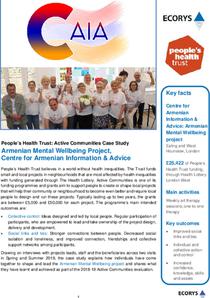Main activities
Weekly art therapy sessions, one-to-one therapy
Where
Ealing and West Hounslow, London
Key outcomes
- Improved social links and ties
- Individual and collective action and control
- Increased confidence, knowledge, skills and assets
When
2018 -2020
The Armenian Mental Wellbeing project was a new, two-year project providing weekly meetings for vulnerable and marginalised people from the Armenian community in Ealing and Hounslow in West London. The project was delivered by staff at the Centre for Armenian Information and Advice, and activities were developed based on their knowledge of the needs of service users at the Centre.
The project aimed to provide a safe and culturally familiar environment for members of the local Armenian community to speak openly, share their personal experiences and learn about mental health. It was hoped that participants would gain mutual support from their peers, develop their self-awareness and ultimately improve their confidence and resilience to manage challenging situations.
By bringing people from the local Armenian community together, weekly sessions enabled the development of social relationships between participants. At an individual level, participants described enjoying meeting new people and discussing various topics with people from different backgrounds. Importantly, the shared language and culture of participants facilitated connections both with each other and Armenian culture and tradition. Some participants had developed friendships to the point where they would meet up outside of the weekly activities.
CAIA project members
One resident, Amanda, came from a background of abuse. She had social phobias and a lack of trust in others. Amanda felt safe within the group and became increasingly confident in sharing her ideas. Attending the group made a significant impact on Amanda’s wellbeing.
Amanda had suggested setting up a WhatsApp chat for the group, but then discovered that not all group members understood how to use WhatsApp. She had the idea of running a skill-sharing group where she and other participants could share their knowledge, including delivering informal training in using technology. She spoke with the project facilitator and was able to use the venue at the Centre after weekly art therapy sessions had finished.
The first skill-sharing session was a success, and Amanda described positive personal outcomes. Amanda’s ability to take initiative by designing and leading on a new element of the project had clear positive outcomes at an individual level. She described both increased happiness, empowerment and self-worth as a result.
“Never mind my rheumatoid arthritis, I was skipping like a bunny rabbit, it felt really good that I could help someone else... It's the fact that they can trust me.”
Amanda believed that the skill-share activity would allow more participants to feel empowered and that the sessions could give participants a sense of ownership over project activities. By the time of the second visit, Amanda had not had enough time to formalise the skills sharing sessions but described how participants had naturally continued to share skills with one another as they got to know each other. Amanda was taking on board suggestions from the group so that they too could benefit from sharing their skills and shaping project activities.
“I totally feel that it is for our personal development. Feeling a sense of worth, that we are not just victims. We have something to offer the world and others want what we have, it is overwhelming.”
The project was funded by People’s Health Trust with money raised through The Health Lottery in London West.
This case study was carried out by Ecorys UK, who are conducting an independent evaluation of People's Health Trust's Active Communities programme. This case study formed part of the last year of the evaluation process.

